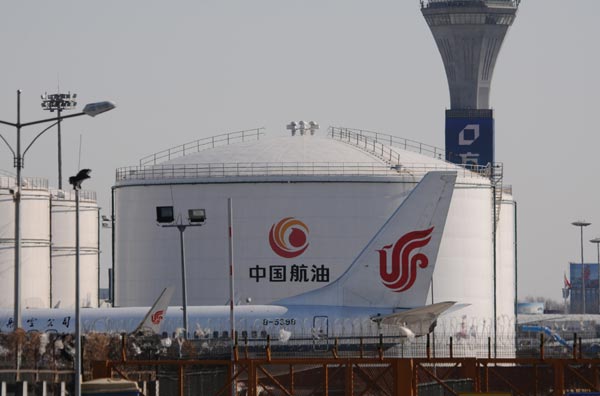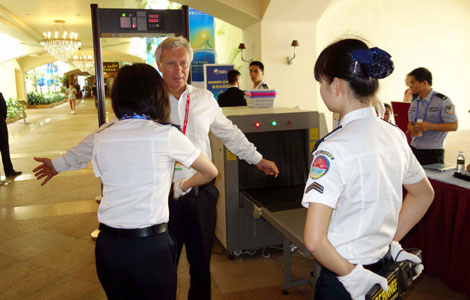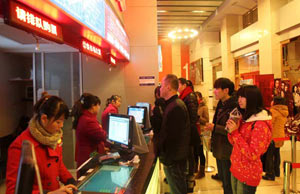
|
 An Air China aircraft next to an oil depot. Fuel costs accounted for 44.12 percent of Air China's operational costs, while the percentage for China Southern stood at 44.2 percent. [Photo/China Daily] |
Carriers say negative global factors will continue to plague industry
China's three largest airlines saw their net profits decline in 2012 and have a cautious outlook for this year, as negative global factors are still expected to affect the civil aviation industry.
The airlines' profits declined for three consecutive years, after they posted solid figures in 2010.
China Eastern Airlines Co Ltd's net profit decreased 29.81 percent year-on-year to 3.43 billion yuan ($547 million), the lowest drop among the three major carriers.
China Southern Airlines Co Ltd's net profit was down 48.22 percent year-on-year to 2.63 billion yuan, while Air China Ltd posted a net profit of 4.95 billion yuan, a decrease of 33.82 percent compared with the previous year.
The airlines attributed the lackluster results to the global economic turmoil and high prices of jet fuel last year.
Fuel costs accounted for 44.12 percent of Air China's operational costs, while the percentage for China Southern stood at 44.2 percent.
China Eastern said that fuel costs increased 2.2 percent in 2012 year-on-year, accounting for 39.99 percent of its total costs.
Jet fuel prices increased about 6 percent in 2012 compared with 2011, weighing on the airlines' costs, said Li Lei, an aviation analyst with China Minzu Securities. There are no indications that fuel prices will decline this year, he added.
Fuel prices will remain at a high level in 2013, said Tan Wangeng, general manager of China Southern.
"Fuel prices may increase and have an adverse effect on the airline's performance in 2013," China Southern said in a statement.
Tan said the airlines will rely on fuel-hedging deals to ease the situation.
Meanwhile, China's improved high-speed rail network was another reason cited for the profit declines.
The railway network will be further boosted in 2013, which will continue to hit the carriers' short-haul route businesses, China Southern and China Eastern said.
China Southern suffered more from the high-speed rail competition than its rivals, as domestic routes contribute more to the carrier's bottom line than they do to the other two, some experts said.
The airlines are also keeping a close eye on the uncertainty surrounding the global economic situation, which may lead to changes in air transport trends.
"For 2013, even though the global economy is expected to remain unpredictable, while the domestic economy slows, growth in the airline industry should remain steady," China Eastern said.
"The European debt crisis will still have an adverse effect on the industry in 2013, " said Wang Changshun, Air China's chairman.
However, Wang forecasted that China's air passenger transport growth will exceed the country's GDP growth in 2013, which is targeted at 7.5 percent.
"Benefiting from the healthy development of China's economy and the opportunities from the economic transition, China's civil aviation market has the highest potential worldwide," Wang said.
Thanks to the robust number of outbound passengers, Chinese airlines still performed very well compared with their foreign counterparts in 2012.
Profit margins were kept at about 5 percent for Air China, and at 2.5 percent for China Southern, while the profit margins of some carriers in other Asian countries and regions were below 2 percent, said Li Xiaojin, a professor at the China Aviation University in Tianjin.
Because the number of Chinese residents traveling overseas increased 18.4 percent in 2012, Chinese airlines saw better results for their international routes than for their domestic routes.
Airlines also got the best operational results in the third quarter of 2012, which is a peak season for outbound traveling, Li said.
"If Chinese airlines keep investing in their international routes in 2013, they will get better results than in 2012," Li said.
Ma Xulun, general manager of China Eastern, said, "China Eastern will invest 30 percent of its newly increased transport capability into international routes in 2013."
Contact the writers at [email protected] and [email protected]
 'Cat model' to dazzle Shanghai auto show 2013
'Cat model' to dazzle Shanghai auto show 2013
 Models at Tokyo modified car show
Models at Tokyo modified car show
 Shanghai Fashion Week focuses on domestic brands
Shanghai Fashion Week focuses on domestic brands
 Angel-dress models at Shandong auto show
Angel-dress models at Shandong auto show
 Safe and Sound
Safe and Sound
 Theater firms scramble for managers
Theater firms scramble for managers
 Premier pledges closer ties with Brunei
Premier pledges closer ties with Brunei
 Volkswagen's all-new GTI at New York auto show
Volkswagen's all-new GTI at New York auto show